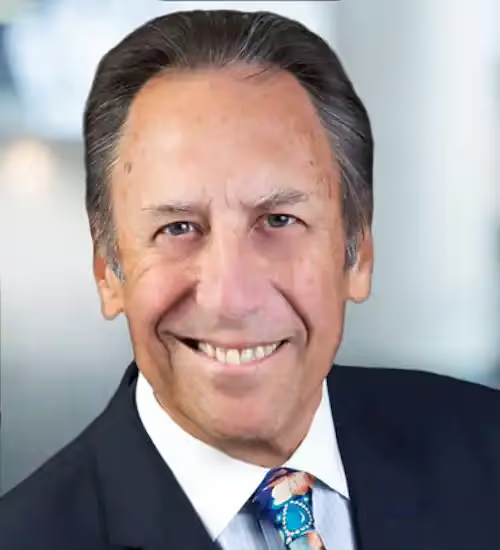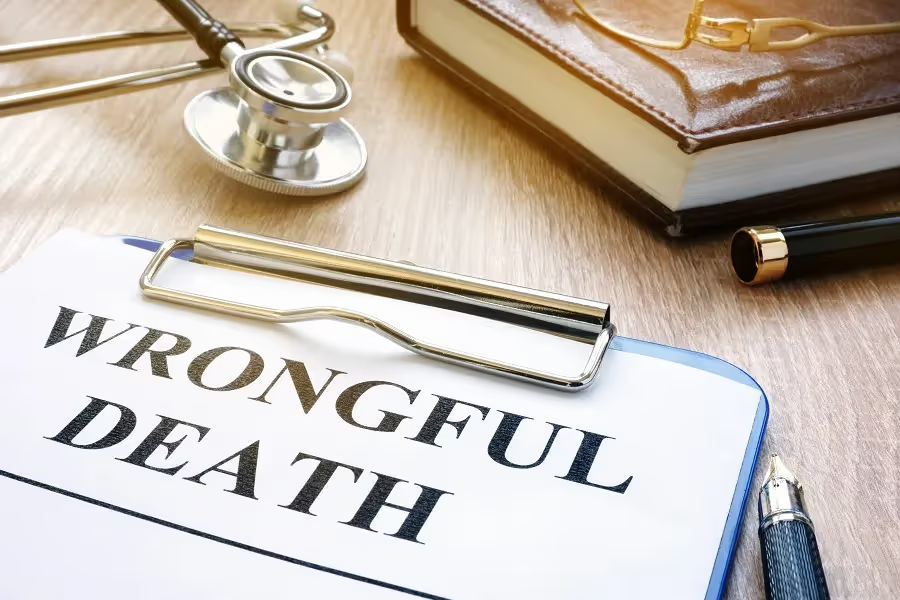Rob Fellows is a renowned personal injury attorney with over 40 years of experience. As managing partner at Fellows Hymowitz Rice, he is known for his meticulous preparation and aggressive advocacy in the courtroom.
After a serious injury, life can quickly become overwhelming — medical bills keep coming, work is uncertain, and the stress of what comes next can feel unbearable. Finding the right personal injury lawyer in NYC is one of the most important decisions you’ll make, but with so many options, how do you know who will truly fight for you?
Not all attorneys have the experience, resources, or dedication to win the maximum amount of money possible for you and your family. Don’t get distracted by impressive office spaces and convincing advertisements that are too good to be true. At Fellows Hymowitz Rice, our team of experienced New York State personal injury lawyers believes that informed clients make better decisions about their legal representation. That's why we've compiled these essential questions to ask a personal injury lawyer during your search for representation.
1. What Is Your Track Record with Cases Similar to Mine?

When meeting with potential personal injury lawyers, inquire about their history of handling cases comparable to yours. A seasoned attorney should readily provide examples of similar cases they've resolved successfully without breaching client confidentiality.
Look for specific details such as:
- Settlement amounts or verdict outcomes for comparable injuries.
- Challenges they encountered and how they overcame them.
- Timeline for case resolution.
- Percentage of cases that proceed to trial versus settle.
This information reveals not only the lawyer's familiarity with your type of case but also their ability to secure favorable results. Personal injury attorneys work differently, and their approach to negotiation and litigation significantly affects your outcome.
2. How Do You Communicate with Clients Throughout the Process?
Communication breakdowns often lead to client frustration during personal injury cases. Ask each prospective attorney about their communication protocols:
- Will you speak directly with the attorney or primarily with paralegals?
- How quickly can you expect responses to emails or calls?
- Will you receive regular updates, or should you initiate check-ins?
- How will complex legal concepts be explained to ensure your understanding?
At our personal injury law firm, we believe transparent communication forms the foundation of effective representation. The attorney's answer reveals their commitment to keeping you informed and involved throughout your case.
3. What Is Your Assessment of My Case's Value?

While no reputable personal injury attorney can guarantee a specific outcome, experienced lawyers should provide a realistic evaluation based on similar cases they've handled.
The attorney should outline factors that might increase or decrease the value of your personal injury claim, such as:
- Severity and permanence of injuries.
- Impact on earning capacity.
- Available insurance coverage.
- Comparative negligence considerations.
- Strength of liability evidence.
Be wary of any lawyer who promises specific dollar amounts during your initial consultation. Instead, look for a thoughtful analysis that acknowledges your case's strengths and potential challenges. Over the last four decades, we have won thousands of cases and millions of dollars for our clients.
4. Do You Have Trial Experience, and How Often Do Your Cases Go to Trial?
Most personal injury cases settle before reaching court, but the willingness and ability to go to trial often leads to better settlement offers. When you ask a personal injury lawyer about their trial experience, listen for:
- Specific examples of verdicts they've secured at trial.
- Their comfort level with courtroom procedures.
- Whether they handle trials personally or refer them to other attorneys.
- The percentage of their cases that proceed to litigation.
- Their reputation with insurance companies for willingness to try cases.
Their response reveals whether they're primarily settlement-focused or prepared to advocate for you in court when necessary. Insurance companies track which law firms regularly try cases versus those that typically settle quickly — often for less than optimal amounts.
5. Who Will Actually Handle My Case?
At larger personal injury firms, the attorney you meet initially might not be the one managing your case day-to-day. Clarify who will be responsible for:
- Communicating with the insurance company.
- Gathering evidence and interviewing witnesses.
- Drafting legal documents.
- Representing you at hearings or trial.
This question helps prevent surprises and ensures you're comfortable with everyone who will work on your personal injury lawsuit.
6. What Is Your Attorney Fee Structure, and What Expenses Might I Be Responsible For?
Most personal injury attorneys work on a contingency fee basis, meaning they receive a percentage of your recovery rather than charging hourly rates. However, the details matter:
- What percentage is the contingency fee?
- Are there different fee structures for settlements versus cases that go to trial?
- Who pays for expert witnesses, medical evidence gathering, and filing fees?
- Will I need to pay costs if we don't win the case?
- Are there any hidden expenses I should know about?
Ask for this information in writing before making your decision. Being aware of the financial arrangement prevents misunderstandings later and helps you evaluate the overall value the attorney provides.
7. How Long Do You Anticipate My Case Will Take?
While each personal injury claim follows its own timeline, experienced lawyers can provide reasonable estimates based on the complexity of liability issues, the severity of injuries and treatment timeline, the court backlog in the relevant jurisdiction, and the other party's willingness to negotiate. They should also address whether the case will likely settle or go to trial, as this significantly impacts timing.
The answer should acknowledge variables rather than promising unrealistically quick results. Personal injury cases involving severe injuries often take 1-2 years or more to resolve properly. A car accident lawyer who promises lightning-fast results may be planning to accept the first offer from the insurance company rather than fighting for fair compensation. Knowing the timeline helps you plan financially while your case progresses through the legal system.
8. What Potential Challenges Do You See in My Case?
Effective personal injury lawyers identify potential obstacles early and develop strategies to address them. Their assessment might include:
- Issues with evidence preservation.
- Multiple potentially liable parties.
- Pre-existing medical conditions.
- Witness credibility concerns.
- Applicable damage caps or legal limitations.
This question reveals the attorney's analytical abilities and honesty. Rather than just highlighting strengths, they should acknowledge challenges while explaining how they'll work to overcome them.
9. What Role Will I Play in the Legal Process?

Your involvement significantly impacts your case's progress and outcome. Ask about expectations regarding how often you'll need to provide information or documentation, your role in gathering medical evidence and records, and whether you'll need to appear for depositions or hearings. You should also inquire about how your input affects settlement decisions and your responsibilities for tracking medical bills and lost wages.
The response indicates how the attorney views the client-lawyer relationship. The best personal injury attorneys recognize you as a partner in the process, not just a case number.
10. Why Should I Choose You Over Other Personal Injury Law Firms in New York?
This direct question often elicits revealing responses about what truly distinguishes the attorney. Look beyond generic answers about "personal attention" or "aggressive representation".
Meaningful differentiators might include:
- Specific subject matter knowledge relevant to your case.
- Resources for comprehensive investigation and expert testimony.
- Technology that enhances case management and client communication.
- Recognition from peers in the legal community.
- Approach to negotiation and litigation strategy.
Their answer should reflect authentic values rather than marketing language. It's your opportunity to assess whether their strengths align with your needs.
11. What Is Your Approach to Settlement Negotiations?
Knowing how a personal injury attorney handles negotiations provides insight into their overall strategy. Effective negotiators build compelling demand packages supported by thorough evidence and understanding of an insurance adjuster’s motivations and limitations. They time settlement discussions strategically for maximum leverage and know when to involve mediators or other neutral third parties. The most successful attorneys balance assertiveness with realistic expectations.
The response should demonstrate strategic thinking rather than a one-size-fits-all approach to negotiations. Many attorneys claim to be "aggressive" negotiators, but the best lawyers tailor their approach to the specific circumstances of your case and the tendencies of the particular insurance company involved. Ask for specific examples of how they've handled similar negotiations in the past.
12. How Do You Determine When to Accept a Settlement Versus Proceed to Trial?

This question reveals the lawyer's decision-making process at a critical juncture in your case. Listen for:
- How they evaluate personal injury settlement offers against potential trial outcomes.
- Whether they conduct mock trials or focus groups for significant cases.
- How they involve clients in the ultimate decision.
- Their risk assessment methodology.
The answer shows whether they make recommendations based on your best interests or their convenience.
13. What Resources Does Your Firm Have to Investigate and Prove My Case?
Car accidents and other personal injury cases often require substantial investigation. Ask about the firm's:
- Network of accident reconstructionists, medical experts, and other specialists.
- Technology for evidence preservation and presentation.
- Support staff for comprehensive document review.
- Financial capacity to advance case-related costs.
These resources directly impact the thoroughness of case preparation and, ultimately, the compensation you receive.
Choosing Your Legal Advocate: Trusted to Win, Proven to Deliver
Selecting the right personal injury lawyer significantly impacts your physical and financial recovery. The answers to these questions help you assess not just competence but also compatibility with your communication style and values.
At Fellows Hymowitz Rice, we welcome these questions and believe that informed clients make better partners in the legal process. Our attorneys bring decades of combined experience to each personal injury claim and have a record of success in negotiations and trials.
If you've been injured in New York City or the surrounding regions, we invite you to schedule a free initial consultation with our team. Contact us today to discuss your case with our experienced attorneys!

You’re Not Alone in This. Talk to Our Experienced Lawyers Today.
Contact us today for a free consultation!
Contact Us
Heading
Lorem ipsum dolor sit amet, consectetur adipiscing elit, sed do eiusmod tempor incididunt ut labore et dolore magna aliqua. Ut enim ad minim veniam, quis nostrud exercitation ullamco laboris nisi ut aliquip ex ea commodo consequat. Duis aute irure dolor in reprehenderit in voluptate velit esse cillum dolore eu fugiat nulla pariatur.






